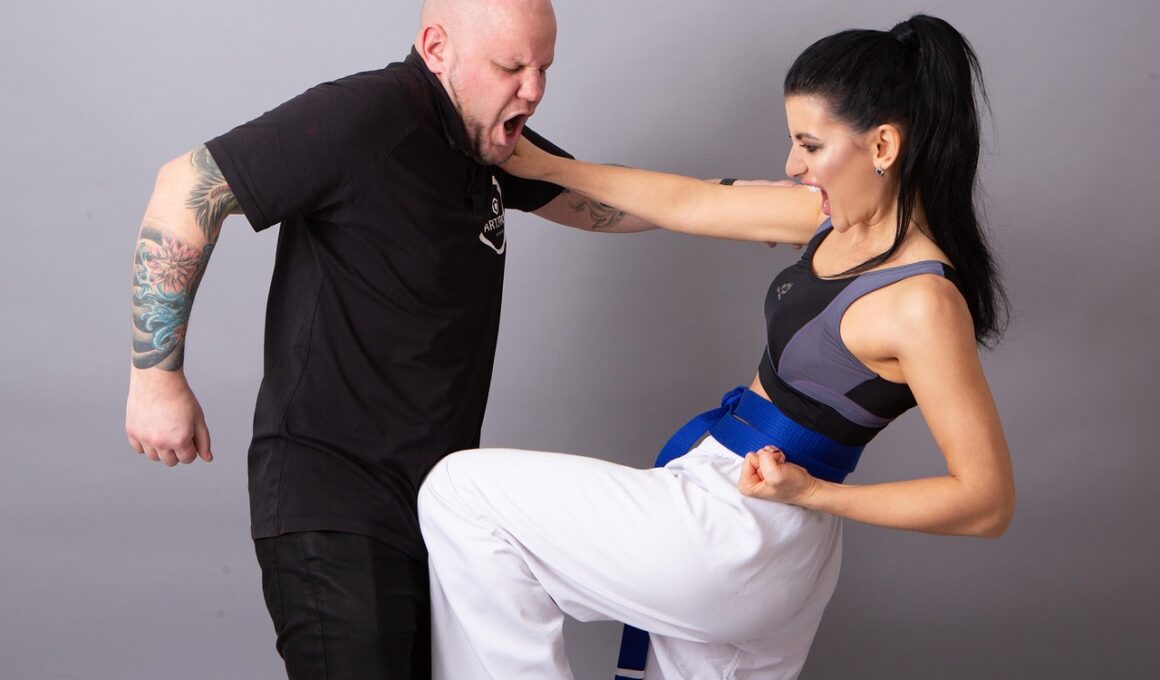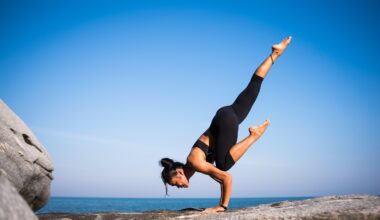Common Mistakes to Avoid in Self-Defense Competitions
Self-defense competitions can be intense, demanding both physical and mental focus. A prevalent mistake is competitors neglecting to study the rules thoroughly. Understanding the competition format is crucial, as rules influence strategy. Without this knowledge, athletes might misuse techniques or violate guidelines, leading to disqualification. Another mistake is underestimating opponents based on appearance. Competitors may look less prepared, but experience varies across all participants. Approaching each match with equal respect allows for better performance. Preparation is vital, including mental rehearsals and physical practice. Athletes should work with coaches to improve not just skills but also game plans. A common pitfall is neglecting cardio fitness, which can hinder stamina. Relying solely on technical abilities can be detrimental when energy wanes during a match. Additionally, overconfidence is a dangerous mindset; it leads to complacency. Preparation and awareness can keep competitors sharp. Another mistake is failing to account for the stress of competition itself. Mental resilience is equally important in performing well. Practicing under pressure helps simulate competition conditions, thereby increasing confidence and adaptability when executing techniques.
Physical Conditioning and Techniques
Physical readiness goes beyond basic skills in self-defense competions. A crucial mistake involves neglecting to incorporate varied training routines. Routines should include strength, flexibility, and endurance components for a balanced approach. Many athletes focus solely on specific techniques, ignoring overall fitness, and it can lead to a sudden drop in performance during matches. Another misconception is assuming mastery of techniques is sufficient. Constantly refining moves while incorporating feedback from coaches keeps performance sharp. Even minor adjustments can enhance execution. Moreover, athletes frequently overlook the importance of recovery. Proper rest and active recovery reduce injury risk, improving long-term performance. Failing to incorporate these practices can lead to burnout and injuries, ultimately affecting competition outcomes. Hydration is also a key factor that some competitors dismiss, particularly leading up to competitions. Dehydration affects performance drastically, diminishing concentration and physical capabilities. Lastly, warmth-up routines are often rushed. Taking sufficient time for warm-ups can help avoid injuries, enhance muscle performance, and prepare mentally. A good pre-competition routine sets the stage for a maximized performance.
The psychological aspect of self-defense competitions is another area where mistakes can occur. A common error is not mentally visualizing successful performances. Visualization is a powerful tool that athletes can employ to prepare mentally for matches. Picture executing techniques smoothly while staying calm amidst competition stress. Additionally, many underestimate the importance of mindfulness and breathing techniques. Panic can lead to disorganization during vital moments, affecting reactions and execution. Developing a pre-match routine helps calm nerves and set a focused mindset. Anxiety can cripple performance, so practicing calming strategies such as meditation can prove beneficial. Competitors may also get sidetracked by external distractions, losing focus on the task at hand. Keeping a tight concentration on the current event can enhance execution. Staying adaptable is crucial; the ability to adjust to evolving match dynamics separates the good competitors from the great ones. Rigidity often leads to missed opportunities. Engaging in mock competitions can help simulate these situations, fostering adaptability. Dealing with unexpected techniques or strategies from opponents is a skill worth developing. It’s essential to stay aware, learn from each encounter, and grow from those experiences.
Communication with coaches and teammates plays a vital role in success during competitions. One mistake athletes make is failing to respect and utilize input from their coaches. Dismissing valuable advice may lead to repeated mistakes and poor performance outcomes. Coaches often possess experience, offering vital insights. Competitors should be open to constructive criticism and eager to improve. Another mistake is overlooking the significance of teamwork and camaraderie among peers. Learning from fellow competitors through practice allows for greater skill refinements. Sharing strategies fosters a collaborative environment, leading to better preparation. Additionally, athletes must be careful not to overtrain with partners, which can lead to injury or fatigue. Knowing when to step back is key for maintaining long-term performance. Establishing strong communication channels with teammates ensures everyone is on the same page, leading to cooperative practice sessions. Moreover, celebrating small victories helps build team morale. Acknowledging progress enhances the training atmosphere, creating a supportive environment. Confident athletes communicate their feelings, encouraging openness and fostering a stronger team bond, leading to better collective performance.
Preparation and Control
A significant aspect of self-defense competitions is effective preparation and control. One common error is lacking a clear strategy, which severely impacts overall performance. Competitors should establish realistic goals before entering competitions, helping gauge progress. Setting a foundation provides focus and direction, which is essential, particularly during high-pressure matches. Ignoring the importance of sparring in preparation can be detrimental, as it allows competitors to refine techniques under realistic conditions. Practicing with varied opponents helps build necessary adaptability. Implementing diverse drills enhances a competitor’s ability to transition between techniques fluidly. Self-critique is vital, yet many fail to analyze their matches post-competition. Reflecting on performance allows recognition of strengths and weaknesses, providing insights for further training. A also historical data is valuable; analyzing past matches can reveal patterns over time. Furthermore, visual aids such as video reviews enhance comprehension of one’s performance. Lastly, remaining engaged with ongoing training resources keeps athletes informed about new techniques, rules, and trends. Committing to lifelong learning distinguishes successful competitors from the rest.
Nutrition is an often-neglected area that can alter competition outcomes significantly. An all-too-common mistake is underestimating the significance of eating well before competitions. Athletes often rush meal plans, leading to poor choices that compromise performance. Eating a balanced meal filled with carbohydrates, proteins, and healthy fats maximizes energy levels. Throughout the weekly lead-up, competitors need to maintain consistent nutrition, ensuring that their bodies feel strong and prepared. Dehydration only compounds problems and can lead to a downward spiral. Using hydration reminders is one method athletes can adopt to ensure adequate fluid intake. Furthermore, a common error is failing to adjust nutrition plans during competitions. Each match can alter individual energy requirements. Recognizing how dietary needs shift helps maintain energy levels throughout the competition. Meal timing before matches is also crucial; serving as a fuel source, it supports sustained energy. Finally, finding a balance between nutrition and indulgence can enhance morale while remaining competitive. Allowing occasional treats helps maintain motivation while balancing hydration and nutrition for optimal performance.
Post-Competition Reflection and Adaptation
Lastly, post-competition reflection can often be understated in the learning process. Many athletes make the mistake of not taking the time to analyze their performance thoroughly. Self-reflection ensures continuous improvement, providing insight into areas that need work. Gathering feedback from coaches can enhance understanding, allowing athletes to identify which techniques excelled or failed. Constructive reflection is necessary to evolve beyond mistakes. When evaluating, it’s vital to maintain a positive attitude, even when correcting errors. Recognizing how competitors can modify their approach increases future success rates. Engaging in a debrief with teammates and coaches fosters an environment of collective growth, enhancing camaraderie. Adapting techniques after analyzing performance allows for personal growth. Recognizing that every competitor possesses unique styles requires flexibility in training approaches. Moreover, setting new goals based on post-competition evaluations encourages athletes to continually strive for greatness. Finally, celebrating achievements, no matter how small, maintains motivation and encourages further participation. Acknowledging progress fuels the competitive spirit, and will lead athletes on the path to skill refinement and personal excellence.
Overall, self-defense competitions present a valuable opportunity for personal growth while refining skills. Avoiding common mistakes is essential for ensuring optimal performance and fostering a learning atmosphere. Addressing physical conditioning, psychological readiness, teamwork, and nutrition might seem challenging. However, recognizing these critical aspects ensures competitors maximize their potential while engaging in self-defense battles. Balancing mental preparation with physical training is necessary for succeeding in competitive environments. Consistently evaluating strategies and refining techniques keeps competitors sharp and ready to adapt during matches. Each competitor possesses unique skill sets and levels of experience, making cooperation among teammates essential. Competitors should embrace challenges to enhance teamwork and growth opportunities. Learning from experiences—both successes and failures—will pave the way for continuous improvement. Emotional resilience is about remaining focused during inevitable challenges; competitors must engage in self-reflection to embrace and learn from failures. Additionally, embracing constructive feedback and integrating it into training evolves competitors into better martial artists. Striving toward self-improvement is a lifelong journey in martial arts. Overall, the journey within self-defense competitions equips athletes with the tools necessary to not only succeed competitively but also in their personal lives.


